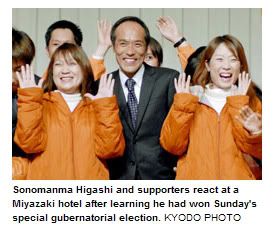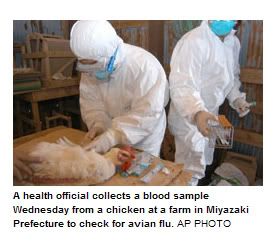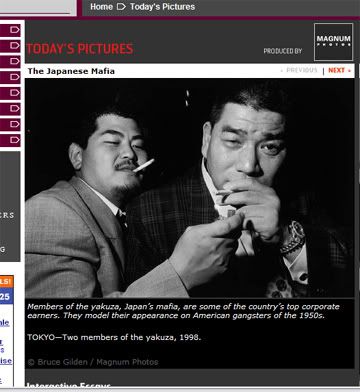(Note- this was originally written before Nova's October 27, 2007 bankruptcy. I'm leaving it for historical purposes. Obviously, you don't want to try to work for Nova now!)
So you're thinking about teaching English in Japan. Let me tell you right now- do it. Don't just think about it; do it. If you're lucky enough to have contacts here in Japan, take full advantage of their hospitality. Bring your resume, your school transcript and some copies of it, copies of your diploma, any letters of recommendation you have and some passport-sized photos of yourself.
You'll need money, of course... and lots of it. But if you're determined, you will find a job here. I think you can find a pretty decent one in about a month, maybe less depending on who you talk to and where you look. The outlook is good. So do it.
On the other hand, if you're like me, you don't like to depend too much on the kindness of others. In that case, why not try working for Nova?
And now you're shouting at your computer: "Nova! What the hell you talkin' 'bout, Joel? I've read all about Nova, and no thanks, buddy. That place is a nightmare!"
Not really. It definitely has its drawbacks, as any big company might. Currently, they're not doing so well financially. But a lot of the major complaints you've probably read on the internet are things you should take with a grain of salt. Some of the complainers are... to put it gently... filthy liars and chronic malcontents. And some have legitimate gripes.
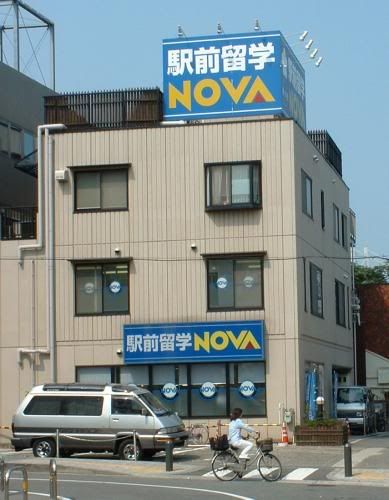 A small branch, probably near a station in a tiny town somewhere.I was lucky in that I taught in a large branch, but not so large thingsgot too hectic. I think the worst case would be working in a Juscobranch with mostly levels 7 and 6 students.
A small branch, probably near a station in a tiny town somewhere.I was lucky in that I taught in a large branch, but not so large thingsgot too hectic. I think the worst case would be working in a Juscobranch with mostly levels 7 and 6 students.Here's a quick-and-dirty guide from someone who worked for Nova for 17 months, who probably experienced the gamut of good and bad working there. But the big difference between myself and those others is I worked in the private sector in the United States for a while before I came to Japan.
And when I came, I came with a positive attitude. Therefore, I thoroughly enjoyed my stint at Nova. I wouldn't do it again... but I'm glad I did it in the first place.
1)
Pay. Nova pays about the same as most English schools. The base pay when I worked there was around 250,000 yen per month. You get an extra allowance if you live in one of the cities where the cost of living is higher, plus bonuses for having advanced degrees, or doing oddball shifts. You can also do overttime and rack up some extra yen.
You get severely docked for missed days and coming in late. There were a few teachers at my last branch who were almost to the point of owing Nova money.
But money was rarely a problem for me. After rent, power and cell phone bills, I had more than enough left over to do whatever I wanted. At one point, I had about $4,000 saved up... which I blew in Tokyo and on a trip home.
If you go out drinking a lot... well, your money won't go too far. I knew some teachers who'd spend the last week or so before payday living on 700 yen. I don't know how they did it.
Oh- and be careful what you sign when you quit. I stupidly sent my last two paychecks home and had to borrow money from a friend or I would've starved to death my final month in Japan. Do not let that happen to you!
2)
Vacation. A lot of people joke that Nova stands for "No vacation." Inevitably, even the students will repeat that joke back to you. The truth is, Nova's vacation policy is pretty much the same as any American company's. 2 weeks paid vacation per year, plus 8 or so days off over New Year's.
You can also do shift swaps, where you trade off days with other teachers. I don't recommend this, because you'll find out very quickly that you treasure your days off. Your weekend won't be Saturday-Sunday... it'll probably be something weird like Tuesday-Wednesday, because the weekend is a busy time for Nova. So enjoy those days. You'll need them.
If you're straight out of college and used to Spring Breaks and Winter Breaks and Summer Breaks... forget that. If you were working for a private company back home, you'd get the same deal. That's part of being an adult. You no longer get to come and go like the will o' the wisp. Suck it up.
The bad part is, you'll have to work on all the Japanese national holidays, plus Christmas (which is not a holiday here). The national holidays are probably Nova's busiest days, because many of the students are office workers and they want to study English on their days off. Plus, they've paid in advance for something like 600 lessons and need to use them.
Nova never gave me any problems as long as I followed procedures about asking for paid leave. Do it by the book, and you get your time. No worries. Don't do your homework, then you have no one to blame but yourself.
3)
Sick leave. Forget it. You can take sick days, but you don't get paid for them. Yes, that sucks. I worked at a newspaper in the States that had the same policy. The problem is, Nova hires a lot of recent college grads and these kids like to get drunk. This leads to begging off work. A lot. My branch had the area record, and just two guys were responsible.
4)
Tardiness. Do not be tardy. For any reason... unless it's a medical emergency. In the case of lateness and absences, the Nova staff have to reschedule everything, and apologize to all the students who suddenly have to change their own personal schedules. If you can't be consistently on time... don't work for Nova. I wasn't late once in 17 months.
5)
Fraternization. It's against the Nova rules, and it's one of the big sources of discontent. The Osaka Bar Association sent a letter to Nova telling them this is against human rights, but the policy hasn't changed. And the Nova staff will spy on you, because it's their asses if students start complaining about favoritism and sexual harassment.
Simply put, don't date the students. Don't even socialize with them.
However... we both know this is a silly rule, one you should and will break. Teachers date students. I dated students. We invited students to our parties. One student was a regular at our apartment, hanging out and drinking beer. The trick is to be discreet. Don't be an idiot. Most teachers who got caught were really hanging it out there and when they got busted, it was because they were stupid. They have only themselves to blame.
I will say this- there are some guys who take advantage of multiple students. It becomes a contest at some branches to sleep with the most students. Teachers level up, or try to, girls they think are cute. Some really sketchy, sleazy stuff goes down and losers who couldn't score with their own hands if they got them drunk first suddenly turn into Jude Law. People get hurt, and hurt badly.
Japan doesn't need people like this. If that's what you want, stay the hell home.
6)
Training. When I started Nova, training consisted of a half-day orientation session in Nagoya (depending on your area, yours may be elsewhere), followed by 3 days of training at my branch. At this time, we were working under the older system, so we discussed grammar a lot. Our trainer eased us into teaching lessons, 10 minutes of one the first day, half of another the second day and finally, a whole lesson on the third. If I'm remembering correctly...
After that came periodic observations and grammar tests. This particular trainer was a hardcore company man, which wasn't necessarily a bad thing because we learned how to teach by the Nova book, and he was very thorough.
By the time I left the company, we had a new teaching method, but training was pretty much the same. I was able to observe some of the trainees and the current lesson plans are pretty easy. I think you could learn in a day.
Later, you'll have opportunities to do CAT training, and once you've cleared probation (3 months), you'll have some follow-up training that covers sales. I think I did one demo lesson my entire 17 months with Nova. The bad part about it is, if your career there follows form, your first demo lesson will come months after your training and you'll have forgotten how to do it. Which will lead to panic and perspiration.
Kid's training is one all-day session, sometimes at your branch, sometimes at a larger, nearby branch. Again, your first kid's class will probably come several weeks or months later, around the time you've completely forgotten what they shoveled into your mind in haste and confusion.
Unless you work at a branch chock-full of kid's classes, in which case they'll throw you into the mix very quickly. This is much preferable to the delayed-action screw job they gave me.
Chibiko is more of the same, but features a lot more singing and acting like an idiot. In practice, however, it can actually be fun.
7)
Lessons. You'll teach 1 to 4 students in regular adult classes. Lessons last 40 minutes and the material itself will probably only last 20 or so if you plow right through it. Do not do this. Pay close attention to the helpful timing charts on the lesson plan and learn to draw things out.
When I started, we had a lot of out-of-date books. The intervals between lessons varied, too. Sometimes, depending on who had the student files you needed, you'd have about 3 minutes to read 4 students' records, choose a lesson, figure out a grammar point, write a dialogue and come up with at least 3 drills for students to attempt.
Now you have 15 minutes between lessons. Check the schedule and see if your students are in a class with another teacher before you start going crazy looking for their files. But even if your other teachers are chatty file-hogs who spend an extra 10 minutes after the bell running their mouths, you should have enough time to find a lesson even if you have a full class.
Most days, you'll have your lesson picked and all your files with 10 minutes to spare. Some trainers or titled teachers (or whatever they're called these days) are laid back and will let you clown around and converse during the left-over time. If not, dawdle and pretend you're still choosing a lesson and take the time to collect your thoughts and relax mentally.
On a typical day, you'll teach 8 classes, but depending on your branch, one or two of those may be super-easy Voice classes (you go to the Voice Room, a sort of lounge where you act as referee while the students talk), or maybe a kid's class or two. Sometimes you'll have open lessons where no students have booked, or else you'll have a no-show (wait 10 minutes in the classroom before reporting back to the teacher's room, but be prepared to rush back in the event the student actually arrives).
The pre-prepared lesson plans make things easier. But the drawback is, you'll find yourself repeating the same lessons ad infinitum. Some teachers complain this creates a fast-food approach to teaching, or that you're not really teaching. But you'll soon discover the lesson plan is just a basic guide. Mix it up, change the lesson, personalize it. If you're teaching some high school kids something that supposedly relates to working in an office, adapt it to a school setting. Use your imagination. The worst teachers just blandly follow the lesson plan. And the students hate them for it.
A good teacher will work in some new, extemporaneous material. Nova discourages you from doing this at first, until you master the teaching form. After that, you're expected to wing it... as long as you pay attention to the lesson timing. The lesson timing is God. Believe me, you'll wish you had worked on it more the first time you're stuck in a class with a single level 7 student and 20 minutes to go before the chimes end this self-created hell.
You'll be expected to be "on" a lot. If you're not naturally perky, learn to fake it. Students want to have a happy, genki teacher. Smile a lot, do not yawn, keep your talking time to a bare minimum and get the students talking.
Sometimes they won't. In that case, you just have to be patient. I cannot stress enough how stupid it is to get angry at students. Learn to be forgiving, develop a love for humanity. It will help a lot.
8)
Help Shifts. A help shift is a funny creature. When some teacher takes a vacation or falls ill, Nova fills the spot by shifting a teacher from his or her home branch. So at some point, one of the Japanese staff will give you a help shift form to sign and act like you're doing them a huge favor by agreeing to go to another school and help out. They're really happy (usually) when you sign. Except... you really don't have a choice.
Sometimes it's a nice change. I decided to transfer to the school where I did some help shifts because the teachers there were cooler and more fun. You'll also get to see a little of the countryside. Sometimes, it's a hassle. You have to get up earlier than usual, catch the right train and possibly even a bus, you may end up teaching 3 Kid's Classes in a row or something horrific like that.
9)
Kid's Classes. Speaking of kids... you will have to teach kids. The guy who interviewed me in Atlanta promised I wouldn't, but our Area Manager told me it wasn't optional. I hated Kid's training. Your trainer will make you do silly things like hold hands with the other teachers and you'll role-play being children. Yikes. But the classes themselves are easier now under the new program with the lesson plans and whatnot... but not as fun.
And it's actually fun to teach kids. It's tiring and not so enjoyable if you have too many in one day. You'll long for even low-level students for conversation and envy the teacher in the Voice Room who's actually talking to people. But your kids will be cute, funny (if you're lucky) and you'll come to like them a lot.
Juniors and Seniors were the most entertaining for me. Kinders... not so much, although some of them were great. Chibiko, which was fairly new when I worked there, seemed like a devious plan made specifically to torture me... until I taught a few classes. Then it actually became fun. Except for the time this one adorable little girl banged her head against the wall, then fell onto a table we'd stupidly left in the classroom, knocking her head once again.
I still cringe when I think about that.
I do have to warn you- there are some discipline problems in Kid's classes. You're not allowed to speak Japanese to the kids (although some smarter teachers do), or take much action at all if the kids get too rowdy. I even had a child spit in my face, at which point I left the class and dared Nova to do anything to me about it.
I also told them I'd never teach that class again, and waited for the hammer to fall. It never did. Our Area Manager at the time was surprisingly sympathetic.
But don't let that put you off. For the most part the kids are great.
10)
Students. The best part of the job. I've read blogs and essays about flaky students, and yeah, I encountered some mental cases. We had one guy who would barely talk at all; all he wanted to do was show you shashinshu of his favorite band. Classes with him could be torture.
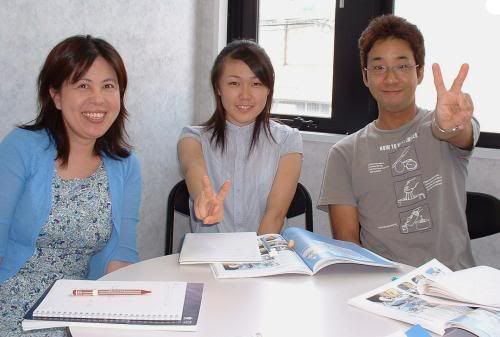 I don't know these people, because I stole these photos off someone'ssite. But these are typical Nova students. Just nice, decent people.This group look like they make classes fun. Hardly a day goes by thatI don't miss students I got to know. They can break your heart, in agood way.
I don't know these people, because I stole these photos off someone'ssite. But these are typical Nova students. Just nice, decent people.This group look like they make classes fun. Hardly a day goes by thatI don't miss students I got to know. They can break your heart, in agood way.
But most of the students were awesome people, as yours will be. They want to learn English, to have fun, to speak their minds in ways they can't with other Japanese. I could never understand the rage some Nova teachers experienced towards them. One highly intelligent teacher would come back to the teacher's room calling all the students "slapdicks" and complaining about how they couldn't speak English.
I think he misunderstood the job requirements.
You have to stay positive, imagine how you'd feel in similar circumstances (a little empathy is most helpful while working for Nova) and accept people for who they are. Be patient. Most of the students mean well. But Japanese culture is different than Western culture. Students are terrified to make mistakes, or are very shy. Speaking terrible Japanese is fun for you and me, but for Japanese learners, using their English sometimes feels like taking your clothes off in front of strangers.
Students do sometimes complain about the lessons. For some reason, even though I never considered myself a particularly good teacher, I managed to go my entire time without a complaint. I can't figure out why, but I even got a couple of compliments. Nova loathes complaints. Nova loves compliments.
Common causes for students' complaints are: yawning, talking too much, not making any sense, being smelly, being sloppily dressed, appearing indifferent, laughing at the students, insulting the students (sometimes inadvertantly), and in one miraculous case I witnessed- attempting to give a student a personal phone number.
That's right- one particularly dense teacher I worked with took some time out of his lesson to write his cellphone number down on a slip of paper, and placed it on the table.
The students gaped. What was this idiot doing, they wondered. No one moved to take the slip, so the teacher slid it across the table to the girl he thought was the cuter of the two.
They both complained. He got into trouble. Don't do idiotic things like this.
If you're like me, and in this I can understand where the guy was coming from, you will develop crushes on certain students. I fell in love once a month. Only I was careful about it. Consequently, other than one incident where a girl somehow decided to pursue me hellbent for leather, I emerged unscathed and so did the students.
11)
Teachers. Your coworkers. You'll meet Aussies, Kiwis, Limeys, Scots, Canucks and Yanks. If you're American, be prepared for some resentment. I had to put up with a few comments here and there that were very prejudiced and rude. And there was a severely anti-Japanese racist contingent at my first branch. Plus some oily sleazos here and there.
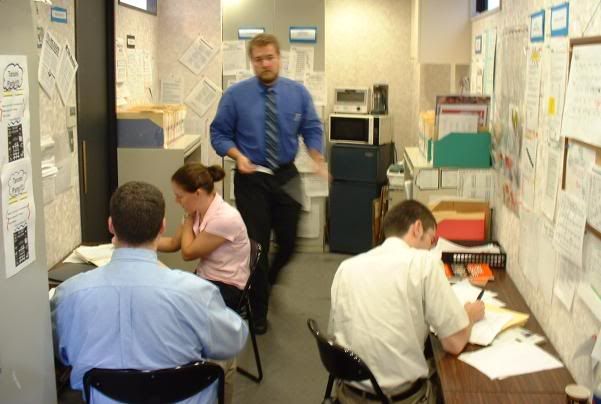 I don't know these people, either. But this is what a Nova teacher'sroom looks like, and those are Nova teachers in their natural habitat,a cramped, boring environment that sometimes feels like a refugeand sometimes like a cell in an insane asylum. And not one of ourmodern, streamlined ones, but one of those murky Victorian insaneasylums where they torture people and rats proliferate.
I don't know these people, either. But this is what a Nova teacher'sroom looks like, and those are Nova teachers in their natural habitat,a cramped, boring environment that sometimes feels like a refugeand sometimes like a cell in an insane asylum. And not one of ourmodern, streamlined ones, but one of those murky Victorian insaneasylums where they torture people and rats proliferate.
But... most of the teachers are fine, wonderful people. I knew a lot of teachers I thought the world of. And if you want to extend that ol' collegiate feel of the instant best friend, Nova is a great place to do that. If you're in your early 20s, like to drink and socialize, you'll fit right in. You may get to do some amazing things, like visit China and Thailand with a happy bunch of young funlovers.
Still, you have to live with them. And probably socialize with them. At Nova, you're sort of caught in a bubble of Nova-dom. If that doesn't bother you, then you'll love it.
12)
Living conditions. More than likely, you'll share a halfway decent apartment with two other teachers. Be warned- Nova makes money off your rent, which they deduct from your paycheck. Nova acts as a middleperson, taking your money and paying it to a landlord. They take more from you than they pay him.
If you're lucky, you'll have a couple of compatible roommates. I wasn't so fortunate. My first apartment had a young, goodlooking dude from Manchester, UK, who was popular with the ladies and knew it which caused no end of drama and headaches for me as his nearest neighbor. Plus a non-entity from Texas who was the dullest, most inconsiderate and sexist human being I've ever encountered.
There was too much gossip and backstabbing going on, too. As soon as you'd leave the izakaya, out would come the cellphones and people would be reporting every little thing you said to everyone else. Not only that, it was clique-y to the extreme.
I got the hell out as soon as I could.
After I transferred, I had two cool guys I liked a lot. One had a steady girlfriend and was very responsible, and the other was a party animal with great sense of humor. He was drunk most nights, and our apartment was the clubhouse for all the Nova drinking buddies. But they were all fun people with likable personalities, so it wasn't so bad. I actually came to enjoy it.
After those two guys left, I got another young, popular-with-the-ladies guy who kept it to himself and caused no problems, and a crude drunk with whom I shared a mutual dislike almost immediately. At that point, I'd had enough Nova.
13)
Japanese Staff. They work harder than you do. And as much pressure as you feel you're under, they're under more. They come earlier and stay later for lower pay. They bear the brunt of not only their mistakes, but your screw ups as well.
Most of the staff I worked with were wonderful, and fun. You can freely date them, although it can cause problems. Just use common sense. But understand this- no matter how friendly they are with you, they don't really trust you. They've been burned by too many irresponsible, callow young dickweeds. So they'll spy on you and report everything to their superiors.
They have to- if it's found out and they didn't report it, once again... it's their asses.
14)
Management. The first Area Manager I worked under was an asshole. The next one was better, and the last one was an awesome person who personally called me and told me thank you for all my hard work, and even offered me another job at Nova if I wanted it.
However... if you date students and get caught, get too many complaints from students, miss too many days, complain too much, come in slovenly and unprofessionally dressed, come in late too many times... they will land on you. Hard, with both feet.
At my first branch, we had one young guy, a part-timer. Super nice guy, just very young. For some reason, he just could not show up on time for his 5:40 class. He was late once or twice a week, and this went on for a month. Finally, they told him he didn't have to leave Japan, but he did have to get the hell out of Nova.
I know of one other guy who got fired. He only lasted 2 weeks, and he became a legend, and yet I knew him when he was but a mere trainee. He stole alcohol from his roomies (my exes, the jackass ones), walked 3 hours home from the one day he actually worked because he couldn't find the train station and was somehow too stupid to ask someone, got into a fistfight with his immediate supervisor at his welcome party, came late to his first day of work, then didn't show up at all for the next two.
The Assistant Area Manager and one of the trainers went to his apartment and told him to get out. At that point... he had no money left. For all I know, he's still here, homeless under the big railroad bridge in Kawasaki, where the destitute have built a tent city.
The lesson here is, if you screw up enough, you can end up tranferred to the sticks, or working an ungodly number of help shifts, but actual firings are rare. If this stuff happens, more than likely, it's your fault. Read some of the horror stories online and I absolutely guarantee you you're only getting half the story, if even that much.
15)
Levels. Nova has this funky level system. It starts with the 7s. 7C is the bottom rung... these students are raw beginners; some may have never even attempted to study English before. 7Bs have a bit more vocabulary and can introduce themselves, and 7As can actually be interesting and creative at times. 6 is the hardest level to exit, and a lot of students get stuck here and lose confidence. 5 is, according to Nova's CAT standards, the base level where you can be considered a speaker of a language; at this level, the students begin to show personality and you can get to know them as people. 4 is another very difficult level, and 3 is very fluent.
You may never teach a 2. I can't remember if I ever had that opportunity. A 2 is probably better at English than a lot of people you knew back home. I'm from Georgia, so this is definitely true.
And you, my friend, are a level 1. Native speaker level. Are there any level 1s in Nova? Maybe in Tokyo. There were rumors... rumors... that some of them were into field hockey players.
Students live to level up. But be careful- some teachers who give the level up tests are stricter than others. So get a real feel for the CAT requirements and assume the worst before you start signing the level up slips. It costs a student a lot of money, and failure can destroy them entirely.
One teacher at my branch gave out a bunch of level slips to students before his last day, mainly the cute girls. And most of them failed. They had to take the test from our Block Trainer, who was a well-known hardass as far as the Nova requirements went. The Block Trainer took the blame from the other teachers... but it wasn't his fault.
He was doing his job the way he was supposed to. The glad-handing teacher was to blame, and believe me, these students were hurt by his grandstanding. He was expert at doing things to make himself look cool as long as these actions cost him nothing... and they cost others too much.
Don't reward students for being cute or sleeping with you, because it can come back and bite you on the ass and really ruin their lives. Make damn sure they are already fulfilling the requirements for the next level before you put that slip in the folder.
In other words, treat them like human beings.
16)
Japan. It's awesome, baby. It really is. Things are a little more expensive than back home, but not ridiculously so. The people are overwhelmingly nice. I've read a lot of negative crap about Japan online, and make no mistake- there are some negatives here. They're not as culturally sensitive as you might like, dealing with banks and some private companies can be a hassle, people are generally sticklers for doing things the Japanese way which may or may not make sense to your delicate Western sensibilities.
The important thing is to put aside what you're used to. The way they do things back home isn't necessarily the correct way. Neither is the way things are done here. They're just different. It's pointless to complain or get angry about it all.
If that's what you're planning on doing... then by all means, stay the hell home.
But if you come with a positive attitude, ready for adventure and the joy of discovery, you will fall in love. Let Japan wrap you in its loving arms. Go to Tokyo, or Osaka. Climb Mt. Fuji. I've done some amazing things I never thought I'd have the chance to do, and I'm still not finished.
That's all I can think of now. Hopefully, this will help you. Read it over carefully, weigh the positives with the negatives, understand that a lot of this is based on my own peculiarities. But if you've been dreaming about it, then get off your lazy ass and get a job teaching English in Japan.
You'll love it. I promise.





